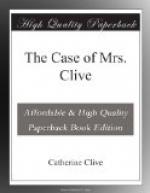The “Ladies” who had promised their protection to Mrs. Clive obviously were influential in convincing Rich to re-hire her, for less than one month after the appearance of Clive’s Case the Prince of Wales and his Princess sponsored at the Haymarket a concert for her benefit,[22] and her name is regularly listed in the Covent Garden playbills soon after. The absence of publicity from Mrs. Clive, or about her, suggests that her second short year at Covent Garden was fairly acceptable to all concerned, although Portia in The Merchant of Venice was hardly her forte.
The next season finds her back at Drury Lane, where she reigns uncontested queen of comedy for more than twenty years. In addition to the return of Clive, the 1745-1746 season (one poor in attendance and new plays) at Drury Lane is noteworthy because of a reinstated Macklin, a de-throned Fleetwood, a new manager (Lacy), a well-balanced company soon to be augmented by player-manager Garrick, prospects for a bright future—and a theatrical monopoly stronger than ever.[23] In the latter regard Mrs. Clive’s case is revealing in that it gives a new emphasis to the epithet His Majesties’ Servants.[24]
Indiana State University
Terre Haute
NOTES TO THE INTRODUCTION
[1] The Dramatic Congress (London, 1743). Throughout I use short titles.
[2] Three major documents concerning this quarrel are published under the title Mr. Macklin’s Reply to Mr. Garrick’s Answer (London, 1743).
[3] Mrs. Clive’s four afterpieces, with their allusions to her personality and career, are equally revealing. I treat this subject in “An Edition of the Afterpieces of Kitty Clive,” Diss. Duquesne Univ. 1968, and “The Textual Relationship and Biographical Significance of Two Petite Pieces by Mrs. Catherine (Kitty) Clive,” RECTR, 9 (May 1970), 51-58, and “Kitty Clive as Dramatist,” DUJ, N.S., 32 No. 2 (March 1971), 125-132.




